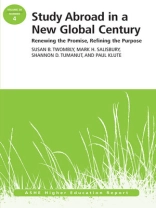Studying abroad has become a key educational means for preparing graduates with the intercultural competencies needed to succeed in our global economy. The federal government, business community, and higher education sector are united in their belief that study abroad is critical to such success.
This monograph seeks to address two fundamental questions:
* Who studies abroad (or who does not) and why?
* What are the outcomes of study abroad?
Increasing and broadening study abroad participation have proven particularly challenging, and the authors look to the research for how it might be improved. Although research suggests positive outcomes of study abroad, existing studies leave educators with some challenging questions. Based on their review, the authors pose recommendations for ways in which study abroad in the twenty-first century can renew its purposes and fulfill its promise.
Table des matières
Executive Summary vii
Foreword xi
Introduction 1
Monograph Purpose 4
Conceptual Framework 5
Sources 7
Audience 8
Author Experiences with Study Abroad 8
Definitions: Study Abroad–What It Is and What It Is Not9
Globalization, Internationalization, and Study Abroad 11
History and Purposes of Study Abroad 13
Beginnings 15
Post-World War II 17
Study Abroad Post-Vietnam 19
Organizational Advocacy for Study Abroad in a Post-9/11 World20
Societal and Institutional Purposes of Study Abroad in the Twenty-First Century 23
Summary 25
Types of Programs and Providers 27
Descriptive, Single-Component Schemes 28
Multiple-Criterion Classification Schemes 30
Who Provides Study Abroad 33
Summary 35
Who Studies Abroad and Who Does Not 37
Who Studies Abroad 40
Factors Affecting Intent to Study Abroad and Participation Rates44
Factors Affecting Men’s and Women’s Participation48
Factors Affecting Study Abroad Participation for Racial and Ethnic Minorities 52
Effects of Degree Aspirations and Field of Study on
Study Abroad Participation 59
Community College Students 63
Summary 64
Study Abroad Outcomes 67
Intercultural Competence and Global Perspectives 68
Other Educational and Developmental Outcomes 77
General Academic Outcomes 80
Effects of Program Duration 87
Career and Other Long-Term Effects 88
Methodological Weaknesses of Study Abroad Outcomes Literature90
Summary 93
Study Abroad: Critical Perspectives 95
Critiques of the Unstated Purposes of Study Abroad 96
Critical Studies of the Study Abroad Experience 100
Summary 103
Conclusions, Final Thoughts, and Recommendations 105
Who Participates, Who Does Not, Why, and What to Do About It?106
Outcomes: The Good, the Bad, and the Indifferent 108
Meeting the Challenge 109
Final Thoughts 117
Notes 119
References 121
Name Index 139
Subject Index 144
About the Authors 151
A propos de l’auteur
Susan B. Twombly and Mark H. Salisbury are the authors of Study Abroad in a New Global Century: Renewing the Promise, Refining the Purpose, ASHE Higher Education Report, Volume 38, Number 4, published by Wiley.












